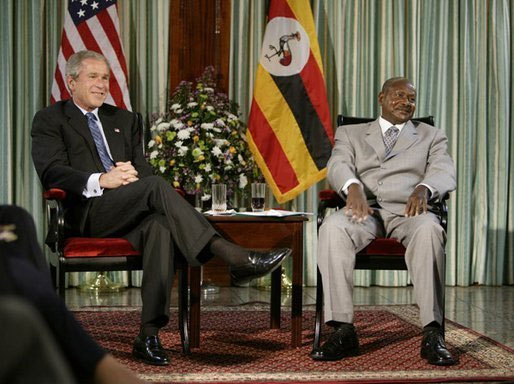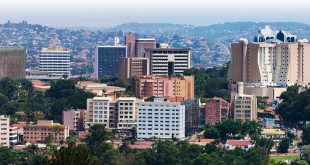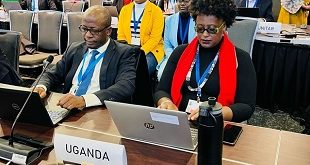
Washington, USA | THE INDEPENDENT & AGENCIES | US President Joe Biden has left African presidents guessing which sub-Saharan Africa countries he will visit first next year.
“I’m looking forward to seeing you in your home countries,” Biden told the ongoing summit of African leaders. “We’re all going to be seeing you and you’re going to see a lot of us.”
Biden added, jokingly, “Some of you invited me to your countries. I said, be careful what you wish for, because I may show up.”
Biden announced the planned trip — still unscheduled — as he wrapped up a U.S.-Africa Leaders Summit on Thursday. He will become the first U.S. president to travel to the continent in a decade.
Two, of only six US Presidents who have made the rare trip to sub-Saharan Africa, have stopped over in Uganda to meet President Yoweri Museveni. That fact puts Kampala on the list of cities likely to be considered on any US President’s visit. (see full list bottom of all previous visits to Africa)

If Biden eventually visits next year, he would be the first US president to visit since Barack Obama went to Kenya, Tanzania, Senegal, South Africa and Ethiopia.
Donald Trump was the first president in four decades not to visit while in office.
Biden in good mood
As he bed farewell to the African leaders Thursday, he said Africa belongs at the table in every room where global challenges are being discussed and in every institution where discussions are taking place.
Biden said he had directed the establishment of the President’s Advisory Council on African Diaspora Engagement in the United States “so we can tap the enormous strength of the diaspora communities here in the United States and make sure their insight and experiences are reflected in our work.”
He said that United States fully supports reforming the U.N. Security Council to include permanent representation for Africa. ” And today I’m also calling for the African Union to join the G20 as a permanent member of the G20.”
In the company of my daughter Natasha Karugire, I attended a dinner hosted by @POTUS and @FLOTUS at the White House. pic.twitter.com/oyTXnmzvRr
— Yoweri K Museveni (@KagutaMuseveni) December 15, 2022
Excerpts from my speech at the US-Africa Leaders Summit. pic.twitter.com/APIf9NpJ5Y
— Yoweri K Museveni (@KagutaMuseveni) December 15, 2022
At the summit with African leaders, the Biden-Harris Administration announced plans to invest at least $55 billion in Africa over the next three years, working closely with Congress. (read full plan here)
Biden plans to establish a new Special Presidential Representative for U.S.-Africa Leaders Summit Implementation to coordinate these efforts. He announced his intent to name for this role Ambassador Johnnie Carson, former Assistant Secretary of State for African Affairs and Ambassador to Kenya, Uganda, and Zimbabwe.
Biden concluded his speech, that mainly promised financial and food support to African nations, by joking about his planned visit next year.
“Vice President Harris is also planning to visit, as is my wife, Jill,” he said.
“Secretary Blinken is on his way. Secretary of Defense Austin. Secretary of the Treasury Yellen. Secretary of Commerce Raimondo. The USAID Administrator, Power. And our Ambassador to the United Nations, Linda Thomas-Greenfield.!
“Promise you’ll send them back. Promise you’ll send them back. I need them. They all want to go, but I’m worried they won’t come back home.”
*****
FULL SPEECH
✳ Remarks by President Biden at the U.S.-Africa Summit Leaders Session on Partnering on the African Union’s Agenda 2063
Happening Now: President Biden delivers remarks prior to the U.S.-Africa Leaders Summit Leaders Session on partnering on the African Union’s Agenda 2063. https://t.co/pDWor61TMo
— The White House (@WhiteHouse) December 15, 2022
11:42 A.M. EST
THE PRESIDENT: Well, good still morning, everyone. I — I realized last night, when our dinner ended and the entertainment ended, it was five o’clock in the morning for most of you. (Laughs.) So I admire your collective stamina. Thank you very much. And I promise my comments will not take you to tomorrow morning.
My friends, I’m honored to host you all here in Washington for the U.S.-African Su- — Leaders Summit. It’s wonderful to spend time with you and your spouses last night at dinner. And I truly enjoyed it, and thank you for making the time.
And let me also convey my condolences to the people of the Democratic Republic of the Congo for the tragic loss of life and the communities impacted due to the flooding.
Mr. President, we missed you last night, but if there’s anything the United States can do to help in this effort, please, please let us know. We’ll do whatever we can.
Today, I’m looking forward to hearing more from all of you about the issues and priorities that matter most to Africa
and how we can deepen our cooperation. And I emphasize “cooperation.”
Our nations have worked closely together for a long time. We’ve improved the lives of countless people in all our countries in meaningful ways, on both sides of the Atlantic.
And with this summit, and with the African Union’s Agenda 2063, our eyes are fixed squarely on the future. We’re now in the early years that will be deci- — that will be a decisive decade.
The choices that we make today and the remainder of this decade and how we tackle these challenges, in my view, will determine the direction the entire world takes in the decades to come.
As I said yesterday, the United States is all in on Africa and all in with Africa.
African voices, African leadership, African innovation all are critical to addressing the most pressing global challenges and to realizing the vision we all share: a world that is free, a world that is open, prosperous, and secure.
Africa belongs at the table in every room — in every room where global challenges are being discussed and in every institution where discussions are taking place.
That’s why I announced in September, at the United Nations General Assembly, that the United States fully supports reforming the U.N. Security Council to include permanent representation for Africa.
And today I’m also calling for the African Union to join the G20 as a permanent member of the G20. Whether it’s — (applause) — it’s been a long time in coming, but it’s going to come.
And today I’m also — whether we’re upholding or defending the foundational principles of global peace and security enshrined in the U.N. Charter and the U.N. — and in the AU’s semil- — seminal documents, or meeting the challenges that impact every nation, the people of Africa are indispensable partners, delivering — to delivering the progress that benefits everyone, not just in Africa and the United States, but the whole world.
The COVID-19 pandemic, followed by Russia’s unjust and unprovoked war against its neighbor Ukraine, has roiled the global economy, erasing many of the development gains that we worked so hard together to achieve over the past two decades.
But that doesn’t change our shared goals and our commitment to seeing them through. It only makes it more urgent for us to take decisive action and take it together.
That’s why, over the next three years, working in close cooperation with the United States Congress, we plan to commit $55 billion in Africa to advance the priorities we share and su- — and to support the Agenda 2063.
That number represents a comprehensive commitment from the United States to invest in Africa’s people, Africa’s infrastructure, Africa’s agriculture, Africa’s health system, Africa’s security, and more.
In our view, our new shared vision statement lays out a forward-looking foundation for the 21st century partnership between Africa and the United States.
It was a great honor to watch today’s World Cup match alongside Prime Minister Akhannouch of Morocco.
No matter who you’re rooting for, it was remarkable to watch how much this team has been able to achieve. pic.twitter.com/5kC4zkT1HQ
— President Biden (@POTUS) December 14, 2022
We want to work with you on these issues that matter most to our people’s lives. And we’re looking to increase our collaboration in every area, from rural communities to urban centers, to cyber space to outer space.
In addition to our investments, we’re also committed to helping African countries assess the financing you need — the financing you need to build sustainable and inclusive economies.
We’re leading a global effort to pursue equitable arrangements for global creditors to provide debt relief so nations can prioritize their people, not back-breaking debt payments.
And I’m asking the Congress for the authority to lend $21 billion to the International Monetary Fund to provide access to necessary financing for low- and middle-income countries — which is so difficult to come by now — and to — will help Africa’s recovery efforts and support projects that build resilience against future crises.
As we engage with your countries, the United States will always lead with our values. Support for democracy, respect for the rule of law, commitment to human rights, responsible government — all are part of our DNA.
That doesn’t mean we always get everything right. We surely don’t. And the work of democracy is never finished or never guaranteed. It’s about consistent and constant self-improvement.
But that’s why democracy is the best tool we have to address the wide range of challenges we all face, and that belief is shared by Africans and Americans alike.
From South Africa’s world-changing triumph over apartheid to Nigeria’s “Not Too Young To Run” movement empowering a new generation of change-makers, to the record voter turnout in Zambia, where young people demanded a better future, we see over and over again that our greatest power is our people.
So one of the new commitments I want to highlight today is the investment in countering democratic backsliding through our new African Democratic and Political Transition initiative.
Collaborating closely with African governments, regional institutions, and civil society, my administration will work with the United States Congress to invest $75 million to strengthen transparent, accountable governance; facilities — facilitate voter registration; support constitutional reform; and more.
We’ll also work to support and strengthen the security benefits that flow from good governance, including with a new 21st Century Partnership for African Security.
Through this three-year, 100-billion-dollar — 100-million-dollar pilot program, the Department of Defense will work with our African partners to boost reforms that build their security capacity.
Now, as every leader here understands, the real measure of success is not in announcements, but it’s in the follow-through. That’s why I’ve asked one of our great diplomats — a man with deep respect for Africa and long experience working with the governments across the continent — to oversee implementation coming out of this summit: Ambassador Johnnie Carson.
Many of you already know him personally. You certainly know his skill and his reputation. So you know that he’s going to make sure we translate our commitments on paper into progress that people can see in their daily lives.
And on Tuesday, I also directed the establishment of the President’s Advisory Council on African Diaspora Engagement in the United States so we can tap the enormous strength of the diaspora communities here in the United States and make sure their insight and experiences are reflected in our work.
And finally, I’m grateful that all of you have made the journey to Washington for this summit, and I’m eager to visit your continent.
As I told some of you — you invited me to your countries. I said, “Be careful what you wish for because I may show up.” The poor relatives always show up. The wealthy ones never show up. The poor come and they eat your food and stay longer than they should. Well, I’m looking forward to seeing many of you in your home countries.
I also directed the establishment of the President’s Advisory Council, as I said, on the di- — on the diaspora, and we’ll get input from them.
This week, President Biden and I are honored to host leaders from across Africa at the U.S.-Africa Leaders Summit. We are guided not by what we can do for Africa, but by what we can do with Africa. pic.twitter.com/Q9qzaTXdXU
— Vice President Kamala Harris (@VP) December 15, 2022
And finally, I’m grateful that all of you have made the journey, as I said.
And I know it’s been long. And I know when you arrive here at — in the middle of the night and then start off a couple hours later at meetings, it’s a long haul.
I — Vice President Harris is also planning to visit, as is my wife, Jill.
Secretary Blinken is on his way. Secretary of Defense Austin. Secretary of the Treasury Yellen. Secretary of Commerce Raimondo. The USAID Administrator, Power. And our Ambassador to the United Nations, Linda Thomas-Greenfield.
Promise you’ll send them back. Promise you’ll send them back. I need them. They all want to go, but I’m worried they won’t come home.
The — but I’m all — all kidding aside, we’re all going to be seeing you and — you’re going to see a lot of us because we’re deadly earnest and serious about this endeavor.
And you’re going to see us deliver our commitments — all of our commitments.
Now we’ve crafted this summit and this agenda in close cooperation with the African Union and focus on African priorities.
The United States fully supports the blueprint you laid out in Agenda 2063 to build an integrated — quote, “integrated, prosperous, and peaceful Africa” that is driven by African people, centered in inclusive and sustainable development and where Africa is an indispensable global partner.
I’m eager to hear from all of you how can the United States deepen our partnerships with you and better work with African nations and the AU to fulfill the aspirations of Agenda 2063.
And I want to thank you all again.
And I’m now going to turn it over to Secretary of State Blinken to facilitate our discussion.
Again, thank you so much for being here. Appreciate it. (Applause.)
11:53 A.M. EST
******
US president visits to sub-saharan Africa.
| President | Dates | Country or territory | Locations | Key details |
|---|---|---|---|---|
| Franklin D. Roosevelt | January 13, 1943 | Bathurst | Overnight stop en route to Casablanca. | |
| January 25, 1943 | Overnight stop en route from Casablanca. | |||
| January 26–27, 1943 | Monrovia | Informal visit; met with President Edwin Barclay. | ||
| December 9, 1943 | Dakar | Stopped en route home to U.S. after conferring with General Dwight D. Eisenhower in Tunis, Tunisia, following Tehran Conference and Second Cairo Conference. | ||
| Jimmy Carter | March 31–April 3, 1978 | Lagos | State visit; Met with President Olusegun Obasanjo. | |
| April 3, 1978 | Monrovia | Met with President William R. Tolbert, Jr. | ||
| George H. W. Bush | December 31, 1992–January 2, 1993 | Mogadishu, Baidoa, Baledogle Airfield |
Visited international relief workers and U.S. military personnel. | |
| Bill Clinton | March 23, 1998 | Accra | Met with President Jerry Rawlings; visited a Peace Corps project. | |
| March 23–25, 1998 | Kampala, Kisowera, Mukono, Wanyange, Entebbe |
Met with President Yoweri Museveni and with the Presidents of Ethiopia, Rwanda, Tanzania, Kenya, and the Democratic Republic of the Congo. | ||
| March 25, 1998 | Kigali | Met with President Pasteur Bizimungu; delivered a public address. | ||
| March 25–29, 1998 | Cape Town, Johannesburg |
Met with President Nelson Mandela; addressed joint session of Parliament. | ||
| March 29–31, 1998 | Gaborone, Kasane |
Met with President Quett Masire; visited Chobe National Park. | ||
| March 31–April 2, 1998 | Dakar, Thies, Goree Island |
Met with President Abdou Diouf; visited Senegalese peacekeeping troops; delivered several public addresses. | ||
| August 26–28, 2000 | Abuja, Ushafa, Abuja |
Met with President Obasanjo and addressed the National Assembly. | ||
| August 28–29, 2000 | Arusha | Met with former South African President Mandela to promote a peace agreement for Burundi; also met with President Benjamin Mkapa. | ||
| George W. Bush | July 8, 2003 | Dakar, Goree Island |
Met with President Abdoulaye Wade. | |
| July 8–11, 2003 | Pretoria | Met with President Thabo Mbeki.[5] | ||
| July 10, 2003 | Gaborone | Met with President Festus Mogae. Toured Mokolodi Nature Reserve. | ||
| July 11, 2003 | Kampala | Met with President Yoweri Museveni. | ||
| July 11–12, 2003 | Abuja | Met with President Olusegun Obasanjo. | ||
| February 16, 2008 | Cotonou | Met with President Yayi Boni.[5] | ||
| February 16–19, 2008 | Dar es Salaam, Arusha |
Met with President Jakaya Kikwete, signed Millenimum Challenge agreement. | ||
| February 19, 2008 | Kigali | Met with President Paul Kagame and dedicated new embassy. | ||
| February 19–21, 2008 | Accra | Met with President John Kufuor. | ||
| February 21, 2008 | Monrovia | Met with President Ellen Johnson Sirleaf. | ||
| Barack Obama | July 10–11, 2009 | Accra | Met with President John Atta Mills. Delivered a speech to the Ghanaian Parliament. Toured a former departing point of the trans-Atlantic slave trade, the Cape Coast Castle. | |
| June 26–28, 2013 | Dakar | Met with President Macky Sall. | ||
| June 28–July 1, 2013 | Johannesburg, Pretoria, Soweto, Cape Town |
Met with President Jacob Zuma and with members of the Mandela family; gave a speech on trade and investment, development, democracy and security partnerships; visited Robben Island. | ||
| July 1–2, 2013 | Dar es Salaam | Met with President Jakaya Kikwete. Laid a wreath at the memorial to the 1998 United States embassy bombing. Participated in trade and investment discussions; accompanied by business leaders. | ||
| July 2, 2013 | Dakar | Stopped during return to Washington D.C. | ||
| December 9–11, 2013 | Johannesburg | Attended the memorial service for former President Nelson Mandela. | ||
| July 24–26, 2015 | Nairobi | Attended the 2015 Global Entrepreneurship Summit. Also met with President Uhuru Kenyatta. | ||
| July 26–28, 2015 | Addis Ababa | Met with the government of Ethiopia and addressed the African Union. |
 The Independent Uganda: You get the Truth we Pay the Price
The Independent Uganda: You get the Truth we Pay the Price


